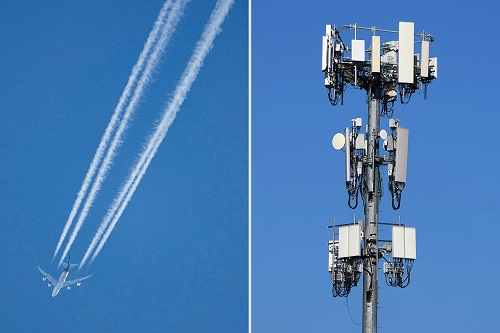National Public Radio reported Verizon and AT&T will switch on high speed 5G service nationwide today, except near airports and runways, because of concerns that high tech radio signals could interfere with navigational systems on some aircraft.
Because of the safety concerns, the Federal Aviation Administration (FAA) has issued notices to airlines that would prohibit certain planes from landing at dozens of airports around the country during poor weather conditions.
The move by the telecom giants to limit 5G near airports averts what domestic airlines say could have been “catastrophic” flight delays and cancellations for thousands of travelers if Verizon and AT&T had implemented 5G service after midnight as planned.
The wireless industry calls 5G a game changer. It provides stronger connectivity and faster download speeds on cell phones and other wireless devices, making streaming, gaming and other uses better than ever. But airlines worry 5G could disrupt altimeter and other key equipment readings.
The Federal Communications Commission auctioned off radio spectrum to wireless carriers in 2020. The segment of the spectrum in the “C” band that AT&T and Verizon purchased sits next to the frequencies used by radio altimeters in aircraft.
“The radio altimeters on our aircraft determine not only the height above the ground, in real terms, above the terrain as we come in for a landing or we’re taking off,” said Joe DePete, head of the Air Line Pilots Association, in a recent interview with Yahoo Finance, adding the altimeters are “tied to many other systems in our aircraft.”
Altimeters are critical for pilots to use during bad weather when visibility is poor. Pilots worry that strong 5G signals from cell phone towers placed close to airport runways could interfere with the radio altimeters.
The CEOs of 10 passenger and cargo airlines, including American, Delta, Southwest, United and FedEx, are urging federal officials, including Transportation Secretary Pete Buttigieg, to establish two-mile 5G-free buffer zones around runways.
AT&T and Verizon say transmissions from their 5G towers will not interfere with aircraft radio altimeters and other aviation electronics, and they say the technology is being used safely in more than 40 other countries.
But the wireless providers postponed turning on 5G towers around some airports, although they did not indicate how many towers or for how long they will delay the 5G implementation.
In a statement, AT&T said, “We are frustrated by the FAA’s inability to do what nearly 40 countries have done, which is to safely deploy 5G technology without disrupting aviation services, and we urge it do so in a timely manner.”
In a statement from the White House, President Biden thanked AT&T and Verizon for reaching an agreement that “will avoid potentially devastating disruptions to passenger travel, cargo operations, and our economic recovery.
“This agreement protects flight safety and allows aviation operations to continue without significant disruption and will bring more high-speed internet options to millions of Americans,” Biden added.










